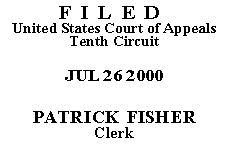

| ROGER LIVERMAN, JR.
Plaintiff-Appellant, v. HENRY J. HYDE AND THE COMMITTEE ON THE JUDICIARY OF THE U.S. HOUSE OF REPRESENTATIVES
Defendants-Appellees.
|
|
ORDER AND JUDGMENT(*)
Before BALDOCK, HENRY, and LUCERO, Circuit Judges.
The plaintiff Roger Liverman, Jr. appeals the district court's order dismissing his petition for a writ of mandamus. In his petition, Mr. Liverman alleged that the defendants the Committee on the Judiciary of the United States House of Representatives and Henry J. Hyde, the Chairman of that Committee, violated his First Amendment right to petition the government for redress of grievances and his Fourteenth Amendment due process rights. According to Mr. Liverman, the defendants failed to schedule a hearing on the petition that he filed with the United States House of Representatives on September 22, 1997. He requested the district court to order the defendants to set a hearing.(1)
Following the recommendation of the magistrate judge, the district court dismissed Mr. Liverman's petition for failure to state a claim upon which relief could be granted. Upon review of Mr. Liverman's mandamus petition and the parties' briefs, we agree with the reasoning of the magistrate judge and the district court. "The Constitution does not grant to members of the public generally a right to be heard by public bodies making decisions of policy. . . . Absent statutory restrictions, the State must be free to consult or not to consult whomever it pleases." Minnesota State Bd. for Community Colleges v. Knight, 465 U.S. 271, 283-85 (1984). Although some of the authorities upon which Mr. Liverman relies suggest that some government agencies may be required to provide hearings in certain situations, those authorities involve citizens who had property or liberty interests at stake. See Aplt's Br. at 11-13 (citing, inter alia, Mathews v. Eldridge, 424 U.S. 319 (1976) and Goldberg v. Kelly, 397 U.S. 254 (1970)).That is not the case here.
Accordingly, the district court's order dismissing Mr. Liverman's petition for a writ of mandamus is AFFIRMED(2).
United States Circuit Judge
*. This order and judgment is not binding precedent, except under the doctrines of law of the case, res judicata, and collateral estoppel. The court generally disfavors the citation of orders and judgments; nevertheless, an order and judgment may be cited under the terms and conditions of 10th Cir. R. 36.3.
1. After examining the briefs and appellate record, this panel has determined unanimously that oral argument would not materially assist the determination of this appeal. See Fed. R. App. P. 34(a)(2); 10th Cir. R. 34.1(G). The case is therefore ordered submitted without oral argument.
2. In light of the issuance of this order and judgment, appellant's motion for immediate ruling is moot.